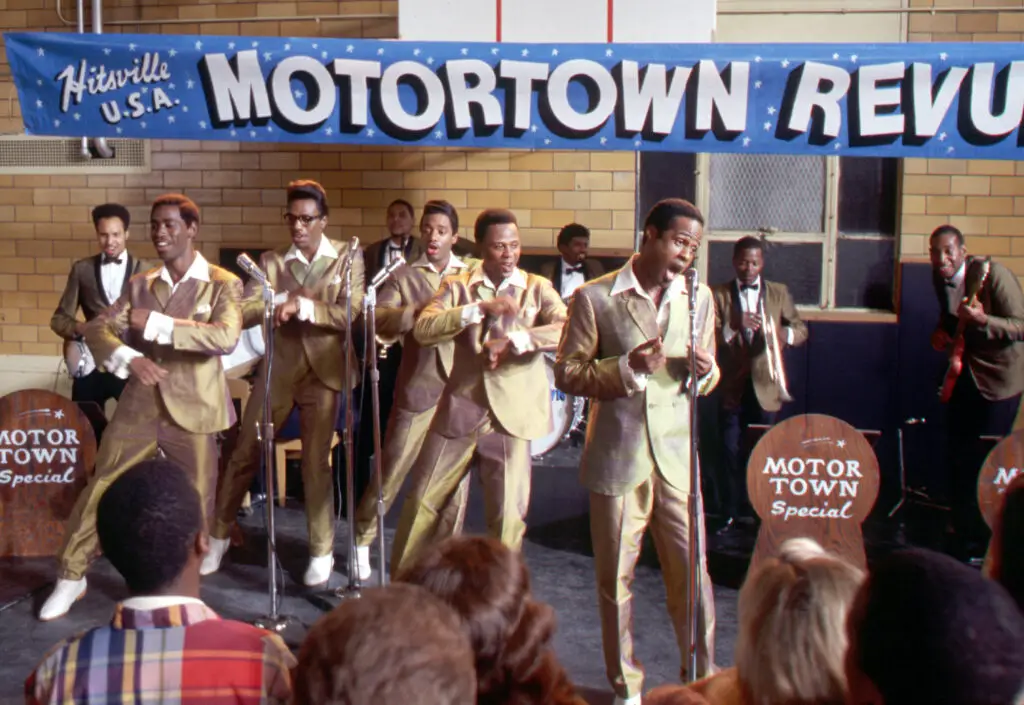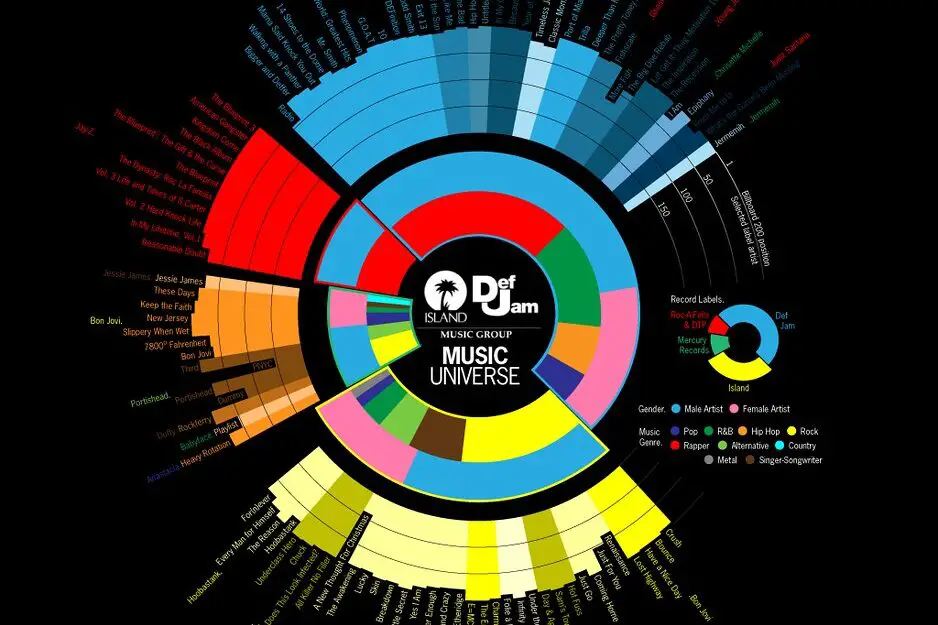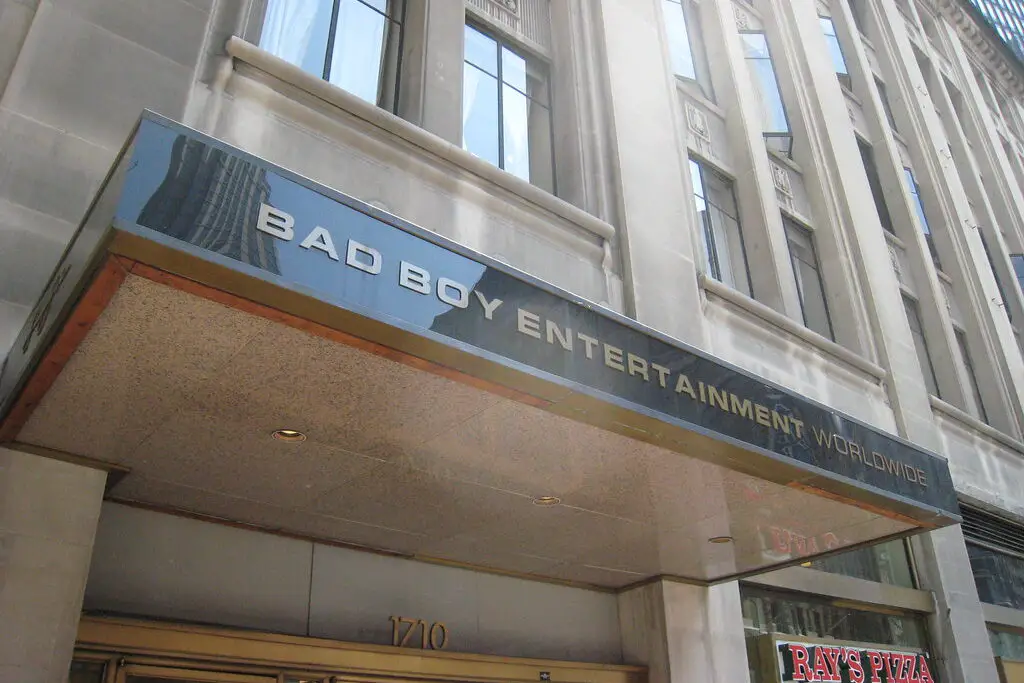1. Motown Records

Motown Records isn’t just a record label—it’s a movement. Founded in 1959 by Berry Gordy in Detroit, Motown became the heartbeat of a generation, crafting a sound that crossed racial boundaries and changed pop music forever. Gordy took a chance on young, raw talent and shaped them into superstars, with artists like The Supremes, The Temptations, and The Jackson 5 defining the era. Motown was more than just catchy songs; it was about an image, discipline, and a polished sound that made Black music mainstream. The “Motown Sound” was a blend of tight harmonies, groovy basslines, and slick production, making the label’s records instantly recognizable. But it wasn’t just about the music—Motown also fostered a sense of community, giving Black artists the opportunity to succeed in an industry that often shut them out. Gordy’s vision turned his small label into an empire, producing over 100 Top Ten hits and launching some of the biggest careers in music history says BET.
Even after leaving Detroit for Los Angeles in the ’70s, Motown’s impact never faded. The label was responsible for Marvin Gaye’s groundbreaking What’s Going On, Stevie Wonder’s socially conscious albums, and Diana Ross’s successful solo career. It became the model for Black entrepreneurship in music, proving that Black artists could not only perform but also lead and own their artistry. Motown’s legacy is everywhere, influencing everything from hip-hop to R&B and pop music today. Without Motown, modern music simply wouldn’t sound the same. Even as ownership changed over the years, the spirit of what Berry Gordy built remains strong. The Motown Museum in Detroit keeps that history alive, reminding visitors of the label’s cultural and musical significance. Its influence can be heard in artists from Beyoncé to Bruno Mars, proving that Motown didn’t just shape the industry—it built it.
2. Def Jam Recordings

When Russell Simmons and Rick Rubin launched Def Jam Recordings from a dorm room at NYU in 1984, they had no idea they were about to change hip-hop forever. At a time when the genre was still finding its footing in mainstream music, Def Jam helped bring it to the world stage. They gave artists like LL Cool J, Run-D.M.C., and the Beastie Boys a platform to break barriers and push hip-hop into pop culture. Simmons, a sharp businessman, and Rubin, a punk-rock-influenced producer, had an ear for raw talent and knew how to package it for a wider audience. Their stripped-down, hard-hitting production style became a signature sound, and Def Jam quickly became synonymous with hip-hop’s golden era. By the late ’80s, they had built an empire, signing legendary acts like Public Enemy and Slick Rick, solidifying themselves as the go-to label for groundbreaking rap music explains GRAMMY.
Def Jam’s dominance didn’t stop in the ’90s—it only got bigger. They played a key role in the careers of Jay-Z, DMX, and Kanye West, three artists who would go on to define hip-hop’s next generations. Under the leadership of industry giants like Lyor Cohen and Jay-Z himself, Def Jam continued to evolve while keeping its street credibility intact. The label expanded beyond rap, embracing R&B acts like Rihanna, who would become one of the biggest pop stars in the world. Def Jam proved that hip-hop wasn’t just a passing trend; it was a global force. Today, even with changes in leadership and ownership, the label remains one of the most respected names in the industry. Its history is a testament to the power of Black entrepreneurship and innovation, showing how a genre that started in the Bronx became the soundtrack of the world.
3. Bad Boy Records

Sean “Diddy” Combs had a vision when he started Bad Boy Records in 1993, and he wasn’t afraid to take risks. After getting fired from Uptown Records, he set out to build his own empire, and he did it in style. Bad Boy’s first major signing was The Notorious B.I.G., and that alone set the label on a path to greatness. With Biggie’s storytelling and Diddy’s marketing genius, Bad Boy became the defining label of ’90s hip-hop and R&B. They had a formula: glossy production, catchy hooks, and a mix of hardcore rap with radio-friendly appeal. Hits like “Juicy” and “Big Poppa” made Biggie a superstar, but Bad Boy was more than just one artist. Faith Evans, Mase, and 112 helped shape the label’s sound, blending hip-hop and R&B in a way that felt fresh and exciting says Time Magazine.
When Biggie was tragically killed in 1997, many thought Bad Boy wouldn’t survive, but Diddy proved them wrong. He reinvented himself as an artist with “I’ll Be Missing You,” a tribute to Biggie that became one of the biggest songs of the decade. Bad Boy thrived into the 2000s, launching artists like The Lox, Total, and later Danity Kane and Cassie. The label set trends, from music to fashion, influencing hip-hop culture in ways that went beyond just records. Even as the industry changed, Bad Boy remained a name synonymous with excellence. Diddy’s relentless hustle kept the brand alive, showing that Black ownership in music wasn’t just possible—it was powerful. Today, Bad Boy’s legacy is cemented as one of the most influential record labels of all time, proving that a dream, when executed with passion, can change the world.
4. LaFace Records

LaFace Records was the brainchild of Kenneth “Babyface” Edmonds and Antonio “L.A.” Reid, and from the moment they launched it in 1989, they had an ear for greatness. Their goal was simple: find and develop the best R&B talent in the game. And they did just that, giving the world icons like Toni Braxton, TLC, and Usher. LaFace had a unique ability to mix traditional R&B with pop sensibilities, making their artists household names. TLC’s CrazySexyCool became one of the best-selling girl group albums ever, while Usher’s My Way cemented him as an R&B superstar. Babyface’s songwriting and Reid’s business acumen created a winning formula, and the label quickly became a powerhouse in the ’90s. LaFace made Atlanta the center of R&B and hip-hop, paving the way for the city’s dominance in the music industry adds The Root.
By the 2000s, LaFace had helped shape modern R&B and continued to influence new generations of artists. OutKast, another LaFace success story, redefined what hip-hop could be with Speakerboxxx/The Love Below, proving the label’s versatility. Even as LaFace merged into Arista and later dissolved into other entities, its impact never faded. Many of today’s biggest artists, from Beyoncé to Drake, owe something to the blueprint LaFace created. The label didn’t just produce hits—it changed the industry by blending genres and breaking records. Babyface and L.A. Reid showed that R&B could be as commercially successful as pop, proving that Black-owned labels could dominate the charts. Their work set the stage for the next wave of Black entrepreneurs in music, ensuring that LaFace’s influence will be felt for decades to come.
